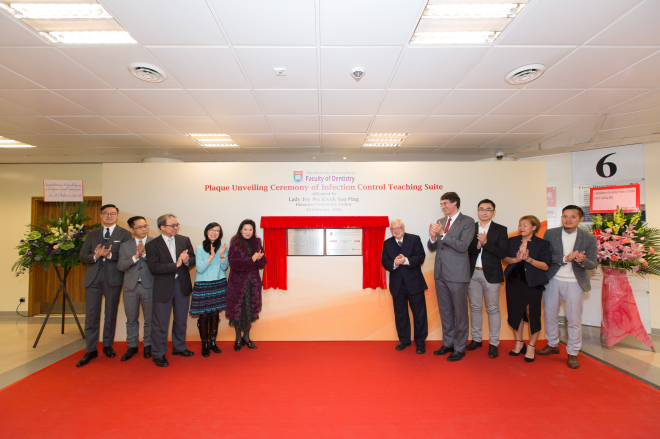Media
HKU sets up first Dental Infection Control Teaching Suite in Hong Kong
22 Feb 2016
The Faculty of Dentistry in HKU has set up the first Infection Control Teaching Suite in Hong Kong with the objective to promote awareness about the prevention of infection in dentistry.
ICTS Plaque Unveiling Ceremony Held In Honour of Donors and Sponsors
To mark the opening of the teaching suite, a plaque unveiling ceremony has been held today.
Present at the officiating ceremony were Sir Gordon Wu Ying-sheung, Honorary University Fellow Lady Ivy Wu Kwok Sau-ping, Under Secretary for Food and Health Professor Sophia Chan, Faculty Dean Professor Thomas Flemmig and Professor Gary Cheung.
Professor Sophia Chan, Guest of Honour on this occasion, noted the significance of education in infection control when addressing the assembly: “Most infections are preventable, and education is the most vital when it comes to infection control.”
“Even with the most advanced sterilization facilities and comprehensive infection control program in place, there is no guarantee of effective clinical practice. Education should be at the forefront in promoting best practices among the oral health workers.”
Faculty Dean Professor Flemmig thanked the donors and sponsors for making such a high-tech teaching suite a reality.
“I would like to say a big thank you to the donors and sponsors, this infection control teaching suite provides an environment where our students can learn the necessary steps of instrument cleaning, disinfection, sterilization as well as waste disposal within the suite,” he said.
“Unlike training provided by means of demonstration or observed practice, the students here will have hands-on experience in the decontamination of instruments and handpieces”.
Professor Flemmig said the Faculty’s undergraduate program had included infection control as part of the education and training.
Teaching and Learning with Advanced Technology in ICTS
Equipped with cutting-edge technology, the ICTS is built and houses a twin instrument cleaning sink, a handpiece cleaner/lubricator, a thermal washer disinfector and two vacuum type autoclaves– all facilities catered for the cleaning, disinfection and sterilization of instruments.
There is also an adjoining classroom, built for the purpose of combining teaching and learning in a safe environment.
Professor Tak Chow, Honorary Professor in Comprehensive Dental Care, one of the architects behind the project, said the use of automated instrument washer disinfectors has come to be understood as the most effective and consistent means of cleaning and disinfecting instruments before sterilization.
“Cleaning and disinfection are the important first steps in the sterilization chain, and these devices help to minimize occupational risks of exposure to the contaminated instruments,” he said.
Contaminated dental instruments, which may carry body fluids, tissues and blood – can be potential agents for blood-borne pathogens including Hepatitis B and C viruses as well as human immunodeficiency virus (HIV).
All the stages are validated to ensure that the instruments had been properly processed for quality assurance.
Professor Chow said the cleaning and microbial inactivation of dental instruments for patients’ safety is only part of the chain of infection control, equally important are hand hygiene, use of personal protective equipment, surface disinfection, maintenance of dental unit waterlines and clinical waste disposal, which can help to prevent cross infection in dental practices.
Professor Gary Cheung, Associate Dean in Undergraduate Education, said it is important that dental students should be well trained in infection control before they become practising dentists.
“Education helps future dentists improve occupational health as well as compliance with professional code of practice set out by the Dental Council of Hong Kong,” he said.
For media enquiries, please contact:
HKU Faculty of Dentistry, Tel: 2859 0494; E-mail: dentke@hku.hk.

